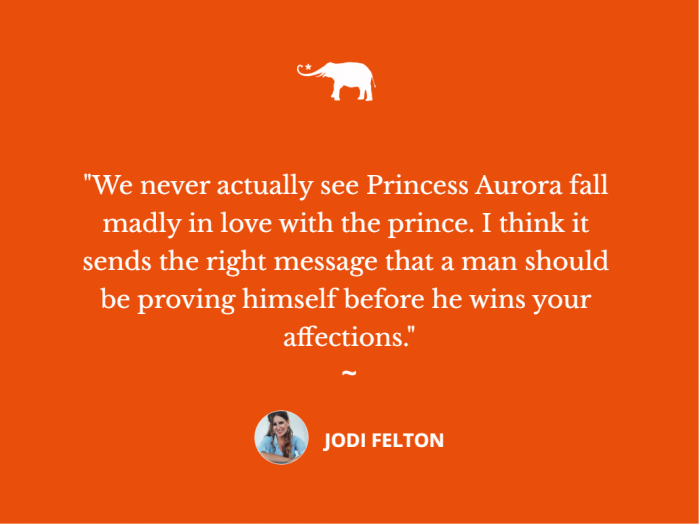View this post on Instagram
Warning: naughty language within—can’t have an article about F*ckgirl Energy without a few f*cks.
~
“Be kind to me, or treat me mean. I’ll make the most of it, I’m an extraordinary machine.” ~ Fiona Apple
~
We know which Disney princesses embody intelligence and brains, bravery and courage, and the ones who embody rebellion and resistance to male dominant tradition.
So many Disney princesses are now written and drawn with traditionally masculine traits that create more balanced and empowering female role models for girls and women.
While I think this is a wonderful thing, I want to talk about a type of balanced energy that’s a little less in your face…that truly embodies the power of feminine energy. One that doesn’t have to decide whether to make it pink or make it blue.
Of all the Disney princesses, Princess Aurora in “Sleeping Beauty” has the least amount of spoken dialogue. If Snow White is an example of a passive princess, and Mulan is an example of an aggressive princess, I see Sleeping Beauty in the middle, as the fuckgirl definition of passive-assertive that I describe in my early fuckgirl articles. Speaking less dialogue, we find Aurora singing and strolling along as a calm, content, chill princess who is preoccupied with her own inner world—rather than a princess who’s more like an action figure, occupying her time chasing a prince or trying to make things happen. Instead, things happen to her and she attracts instead of asserts.
When Princess Aurora meets Prince Phillip in the woods, she hesitates with his forward advances. She hides from him, moving cautiously and slowly at a pace she’s comfortable with…until she warms up and eventually dances with him. She rests her head on his shoulder to take in the view and it’s a sweet moment.
Then suddenly, as the sun is setting, it dawns on her how late in the evening it’s getting and she snaps back into reality and begins running home. The prince is startled and exclaims, “Wait! When will I see you again?” and Aurora responds matter-of-factly, “Oh, never! Goodbye!” At this point, her sensible nature always makes me erupt with laughter. She cracks me up. She’s passively enjoying her time with the prince, and then she snaps right back into being her assertive self. Disney has just shown us that Aurora is not the type of princess who would be easily led astray by a predatory man masquerading as a charming prince. It takes a powerful and malicious spell by an evil woman to finally trip her up.
As a fuckgirl, I relate to her here because I hit moments of hesitation with a new flame before I’m fully sunken in and feeling comfortable. Moments when I’m still deciding and weighing if it’s safe for me to stay put—or should I flee? A fuckgirl doesn’t get attached too early or too easily—it takes me a long time to develop any feelings. This ensures that a sleeping beauty isn’t led astray after meeting a prince. She certainly never chases him—but she does stand back and study him. In fact, we never actually see Princess Aurora fall madly in love with the prince. I think it sends the right message that a man should be proving himself before he wins your affections.
But, I still see “Sleeping Beauty” being analyzed and criticized under a masculine lens. If you’ve read any reviews of “Sleeping Beauty,” you’d find that the stoic, good force conquering evil is actually the three good fairies, which I don’t disagree with. They bestow feminine power upon the prince, which helps him defeat evil. The three good and sensible fairies were also Aurora’s female role models, instead of her own mother, the queen.
Good and evil are equally at play in Aurora’s life. Many good and bad characters have designs for her that she isn’t even aware of. For all the flack that Disney gets for reinforcing traditional gender stereotypes, I don’t know if we give Disney enough credit for the many female villains they gave us in a time when “father knows best.”
“Snow White,” “Sleeping Beauty,” “Cinderella,” and some of the modern ones had evil leading ladies, and I’m glad they did. To be a true feminist, I think you’d have to acknowledge that women are just as capable of being evil as men are. Could having evil, female villains undermining the heroine be considered matriarchal or patriarchal? I think it’s matriarchal because it shows the full spectrum of power that women are capable of, good and evil. In fact, our female monsters make our female heroines shine and save the day, sometimes with the prince’s help. But feminists have knocked Disney for making the women who have power evil and for making the female protagonist helpless and submissive—the damsel in distress needing to be saved by the heroic prince.
I simply do not see Princess Aurora as a weak protagonist.
In fact, I think it’s misogyny at play to say that everyone—except our leading lady—is a good force who saves the day. Through the whole movie, Princess Aurora stays in her inner world. She’s graceful, playful, she expresses all her emotions as they rise, she pleads for her wants and desires, and most of all, my favorite quality about her is that she’s a courageous risk-taker, which lands her in the arms of a virtuous prince and under an evil spell by a hater. It’s her own brave risk-taking that saves her in the end, and that makes her a powerful manifester.
I mean, she sleeps—getting her beauty rest in—through all the action. It’s sort of beautiful, this juxtaposition of exertion and stillness simultaneously, the power of meditation at work. The prince would not have broken the spell if she hadn’t trusted her gut that he was a trustworthy man, thus giving him the opportunity to engage with her. After he kisses her and breaks the spell, our heroine has free will. She flutters her eyes open, smiles at him, and then she chooses him right back—now that he’s proven himself. It’s mutual attraction and mutual consent. To me, that speaks to equality.
Now, I know, I know—that the prince kissed her nonconsensually. A big no-no by today’s PC standards.
But let’s contextualize that medieval kiss.
Did you know that back in the day, before you could call up and hire a lawyer, contracts were often sealed with a kiss? The prince didn’t sexually assault Princess Aurora; he kissed her gently. The original “Sleeping Beauty” is said to be rooted in rape (the original fairy tales are dark and riddled with violence and gruesomeness), so Disney threw out the nonconsensual sexual assault and cleaned it up, respecting Aurora (and women) with a small act of affection, thus replacing the crime with some antiquated, contract law.
You know what else is a contract? Marriage. When men enter into committed relationships, they experience a drop in testosterone—he doesn’t have to work so hard now to win her heart. (Though I believe committed couples should never tire of chasing each other!) The film ends with putting the prince on a path of gentleness and bonded connection, leaving us with the impression that he cherishes Aurora and is not afraid to enter into a new contract with his true love.
I see no bigger champion for contentment, the path of least resistance, and the law of attraction than “Sleeping Beauty.” Good things happened to her. Bad things happened to her. But things did work out for her.
Her life is symbolically centered around her own bed, not someone else’s. She follows her desires, and if she was breaking the female rules of the era via dancing with a man in the forest unchaperoned, I’m sure she’d be a carefree fuckgirl in 2021, having fun and not worrying about chasing men. She never troubles herself with aggressively chasing the prince or manipulating him, or her haters, or any situation. Instead, she remains herself, she accepts her fate (after she cries about it and expresses her emotions), and she ends up attracting everything she wanted into her life. And it is pretty admirable the way her love and connection with the prince saves them both in the end. She’s an object of desire and of jealousy while she remains an island unto herself. And she is one of the most under-recognized and underwhelmingly celebrated heroines for the reasons I point out. She has virtues far beyond physical beauty—she is powerful, and she’s this fuckgirl’s favorite princess.
Practice contentment, spend time in nature, flirt, trust your gut, take risks, dance with strangers, recharge your batteries in bed, and know that even when things seem hopeless, they’re not. Harness your feminine power like Princess Aurora did with your calmness, curiosity, unwavering focus, beauty, playfulness, and passive-assertiveness. Never be afraid to say no to a man (or say never if you’re feeling sassy)! A man worth having will not be deterred by you putting your well-being first. I recommend staying asleep to a man’s advances until he is demonstrating that he values you.
“Sleeping Beauty’s” prince teaches us that feminine energy gives men the soft, vital, and final edge they need to conquer their biggest obstacles. Or as Tori Amos calls feminine power: “An artillery of the soul and resolve.” And if your haters are working hard to undermine you, the one coming to your defense and helping your slay your dragons might just be true love energy. But don’t rigorously analyze it, just sleep on it…yawn.







Read 3 comments and reply